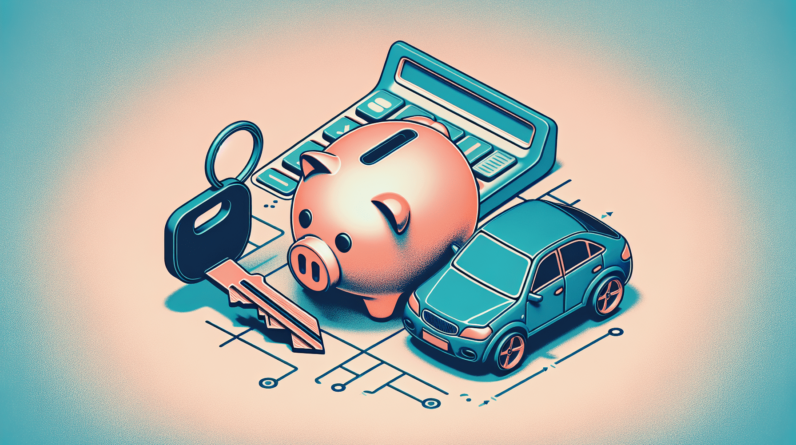
Car insurance is a bit of a mystery to many people, and you may have wondered why it is mandatory. Well, let us shed some light on the subject. Car insurance is required for a very simple reason – to protect you and others on the road from the financial devastation that can occur after an accident.
Without insurance, the financial burden of repairing or replacing your car, as well as covering the medical expenses of any injured parties, could fall solely on you. In this article, we will explore the importance of car insurance and highlight some key reasons why it is mandatory. So, buckle up and get ready to discover the essential role that car insurance plays in your life.
The Purpose of Car Insurance

Car insurance serves multiple purposes that benefit both drivers and other parties involved in accidents. It provides protection, financial security, and promotes responsible behavior on the road. Additionally, car insurance ensures fair compensation, balances the burden on society, promotes access to healthcare, safeguards against unforeseen circumstances, and addresses the financial impact on drivers.
Protection for Drivers
One of the primary purposes of car insurance is to protect drivers from the financial consequences of accidents. Car accidents can result in costly damages to vehicles, medical expenses, and legal fees. By having car insurance, drivers can feel secure knowing that they will be covered in case of an accident, minimizing their potential financial loss.
Protection for Other Parties
Car insurance not only protects the drivers themselves, but also provides protection to other parties involved in accidents. If you cause an accident that results in property damage or bodily harm to others, your insurance policy will cover their expenses. This helps ensure that victims are not left to bear the financial burden of an accident caused by someone else’s negligence.
Financial Security
Having car insurance provides financial security to drivers. Accidents can lead to significant expenses, such as repairing or replacing damaged vehicles, medical bills, and legal costs. Without insurance, individuals may face overwhelming financial strain. Car insurance acts as a safety net, alleviating the financial burden and providing peace of mind.
Legal Requirements
Car insurance is mandatory in many countries and states due to legal requirements aimed at protecting drivers, victims, and ensuring financial responsibility.
National Mandates
In some countries, car insurance is mandated at the national level. Governments recognize the importance of insurance in protecting citizens and enforcing financial responsibility. National mandates ensure that all drivers have at least a minimum level of coverage, guaranteeing that victims can receive compensation in case of accidents.
State Laws
In many countries, car insurance requirements are established at the state level. Governments set specific rules and regulations to ensure that drivers have insurance coverage that meets the state’s standards. States have different minimum coverage requirements, which often include liability coverage for bodily injury and property damage.
Financial Responsibility Laws
Financial responsibility laws exist to ensure that drivers can cover the costs associated with accidents they cause. Car insurance serves as proof of financial responsibility, demonstrating that drivers are capable of paying for damages. These laws aim to prevent uninsured drivers from shifting the financial burden onto victims or the state.
Preventing Financial Loss
Car insurance helps prevent drivers from facing substantial financial loss in case of accidents. It provides coverage for various aspects, including vehicle damage, medical expenses, and legal fees.
Coverage for Vehicle Damage
Car insurance policies typically include coverage for vehicle damage. This coverage helps pay for repairs or replacement of your vehicle if it is damaged in an accident. Whether it’s a minor fender bender or a major collision, knowing that your insurance will cover the costs can bring peace of mind.
Coverage for Medical Expenses
Medical expenses resulting from car accidents can be exorbitant. Car insurance often includes coverage for medical expenses, ensuring that you and your passengers receive the necessary medical treatment without worrying about the costs. This coverage can help reimburse hospital bills, doctor visits, and rehabilitation expenses.
Coverage for Legal Expenses
If you are involved in a car accident that leads to legal disputes, car insurance can provide coverage for legal expenses. This can include the cost of hiring an attorney, court fees, and other legal-related costs. Having this coverage ensures that you have the necessary resources to defend your rights and navigate legal processes effectively.
Encouraging Responsible Behavior
Car insurance plays a crucial role in promoting responsible behavior on the road. It encourages risk reduction and rewards safe driving practices.
Risk Reduction
Insurance companies often reward drivers who exhibit safe driving practices by offering lower premiums. This serves as an incentive for drivers to prioritize safety and reduce risks. By encouraging risk reduction, car insurance helps create a safer driving environment for everyone on the road.
Incentives for Safe Driving
Some insurance providers offer programs or discounts to drivers who demonstrate safe driving behaviors. This could include discounts for maintaining a clean driving record, completing defensive driving courses, or using new technology that monitors driving habits. These incentives further encourage responsible behavior and help reduce the likelihood of accidents.
Ensuring Fair Compensation
Car insurance aims to ensure fair compensation for all parties involved in accidents. It addresses scenarios such as fault determination, no-fault insurance, and covers uninsured and underinsured motorists.
No-Fault Insurance
In some jurisdictions, car insurance operates under a no-fault system. In these cases, each driver’s insurance company covers its policyholder’s expenses, regardless of who caused the accident. No-fault insurance helps expedite the claims process and ensures that everyone involved in an accident receives the necessary compensation promptly.
Determining Fault in Accidents
Determining fault in car accidents can be a complex process. Insurance companies often rely on thorough investigations, police reports, and expert opinions to determine who bears the responsibility for the accident. This determination impacts the allocation of compensation and helps ensure that the responsible party covers the associated expenses.
Uninsured and Underinsured Motorist Coverage
Car insurance policies often include coverage for accidents involving uninsured or underinsured motorists. If you are involved in an accident caused by a driver without insurance or with insufficient coverage, this additional coverage will help protect you financially. It ensures that you can still receive compensation for damages, even if the at-fault driver cannot afford to cover them.
Balancing the Burden on Society
Car insurance helps balance the burden of financial responsibility in society. It spreads risk among a larger pool of individuals, reducing costs for everyone and minimizing public expenses.
Spreading Risk
Car insurance operates on the principle of spreading risk among policyholders. By pooling premiums from a large number of drivers, insurance companies can effectively cover the expenses of accidents. This system prevents an individual from facing catastrophic financial loss by distributing the risk across a broader population.
Reducing Public Costs
Mandatory car insurance reduces public costs by avoiding the need for government entities or taxpayers to cover accident-related expenses. When individuals carry insurance, they are responsible for their own financial obligations, reducing the burden on public services. This ensures that public resources can be allocated to other critical areas.
Promoting Access to Healthcare
Car insurance promotes access to healthcare by providing coverage for medical expenses resulting from car accidents. It also includes personal injury protection to help cover rehabilitation and related costs.
Medical Coverage
Car insurance often covers medical expenses incurred due to car accidents. This coverage ensures that individuals receive the necessary medical treatment and can access healthcare services without facing financial strain. It allows accident victims to focus on their recovery without worrying about the cost of medical care.
Personal Injury Protection
Personal Injury Protection (PIP) coverage is commonly included in car insurance policies. PIP covers medical expenses, rehabilitation, and lost wages for the policyholder and their passengers, regardless of who was at fault in the accident. This coverage acts as a safety net, offering additional financial support in case of injuries resulting from car accidents.
Safeguarding Against Unforeseen Circumstances
Car insurance safeguards against unforeseen circumstances that can cause significant financial loss, such as natural disasters, theft, and acts of God.
Natural Disasters
Natural disasters, such as floods, hurricanes, or earthquakes, can cause extensive damage to vehicles. Car insurance often includes coverage for these events, providing financial protection in case of such unforeseen circumstances. Having insurance ensures that you can recover from the damage caused by natural disasters without shouldering a substantial financial burden.
Theft and Vandalism
Car theft and vandalism are unfortunate events that can result in both financial loss and emotional distress. Car insurance policies often include coverage for theft and vandalism, allowing you to receive compensation for the stolen vehicle or damages caused. This coverage helps alleviate the financial impact of these crimes and facilitates the process of replacing or repairing your vehicle.
Acts of God
Acts of God refer to unpredictable events that cause damage, such as earthquakes, lightning strikes, or falling objects. Car insurance may provide coverage for these events, ensuring that you are protected from the financial consequences of such unpredictable occurrences. It helps drivers restore or replace their vehicles without incurring significant out-of-pocket expenses.
Financial Impact on Drivers
Car accidents can have a significant financial impact on drivers, making car insurance vital for financial protection.
Potential for Costly Accidents
Car accidents can result in substantial financial loss. Regardless of who is at fault, accidents often entail expenses for repairs, medical treatments, and potential legal fees. Without proper insurance coverage, individuals might find themselves burdened with overwhelming debt or unable to afford the necessary repairs and medical care.
Significant Repair Expenses
Vehicle repairs can be costly, especially in the case of severe damage resulting from accidents. Car insurance coverage for vehicle damage helps ease the financial burden by paying for repairs or providing funds to replace a totaled vehicle. This coverage ensures that drivers can restore their vehicles to roadworthy condition without depleting their savings.
Liability Lawsuits
If you cause an accident resulting in injury or property damage to others, you may face liability lawsuits. Legal fees, court costs, and compensation for the injured party can add up to significant expenses. Car insurance with liability coverage protects you from the financial implications of such lawsuits, covering legal expenses and compensating the injured party within the policy limits.
Influence of Industry and Lobbying
The car insurance industry and lobbying efforts play a significant role in shaping insurance policies, consumer advocacy, and legislative factors.
Insurance Provider Influence
Insurance providers influence the types of coverage offered, policy premiums, and claim settlement practices. They analyze risk factors, statistical data, and market trends to determine pricing and coverage options. Insurance companies also rely on actuarial calculations to estimate the probability of certain events and adjust premiums accordingly.
Consumer Advocacy
Consumer advocacy groups play a vital role in ensuring that insurance policies are fair, transparent, and affordable. These groups actively advocate for consumer rights, promoting policies that protect individuals from unfair practices and unreasonable premiums. They work to hold insurance companies accountable and help educate consumers about their rights, coverage options, and eligibility requirements.
Legislative Factors
Car insurance regulations and laws are heavily influenced by legislative bodies. Governments collaborate with insurance industry experts, associations, and consumer advocacy groups to develop laws that safeguard public interest and regulate the insurance market effectively. Legislative factors shape the mandatory requirements, establish minimum coverage levels, and regulate the overall insurance industry to ensure fair practices.
In conclusion, car insurance serves a crucial purpose in protecting drivers, ensuring fair compensation, promoting responsible behavior, and safeguarding against financial loss. It also balances the burden on society, promotes access to healthcare, and addresses the financial impact accidents can have on drivers. By understanding the various facets of car insurance, individuals can make informed decisions about their coverage, ensuring financial security and peace of mind on the roads.






